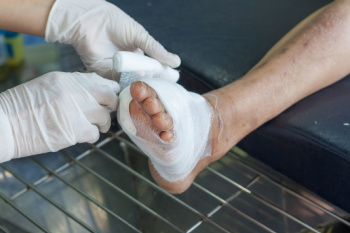
People with diabetes are at a much higher risk of developing foot wounds, which are slow to heal and can become problematic. This slow rate of healing might be due to a weakened immune system, which is common in diabetics. When a foot wound occurs, the immune cells needed for proper inflammation and healing may not function effectively, leading to poor recovery. If you have diabetes, it's important to prevent foot wounds and their complications. A good way to do this is to check your feet daily for any changes, such as cuts, scrapes, sores, or discoloration. If you notice a cut or sore that is taking a long time to heal, it’s suggested you make an appointment with a podiatrist for a diagnosis and treatment options.
Wound care is an important part in dealing with diabetes. If you have diabetes and a foot wound or would like more information about wound care for diabetics, consult with Luis Esquerdo Cruz, DPM from Dr. Esquerdo Podiatry and Laser Center
. Our doctor will assess your condition and provide you with quality foot and ankle treatment.
What Is Wound Care?
Wound care is the practice of taking proper care of a wound. This can range from the smallest to the largest of wounds. While everyone can benefit from proper wound care, it is much more important for diabetics. Diabetics often suffer from poor blood circulation which causes wounds to heal much slower than they would in a non-diabetic.
What Is the Importance of Wound Care?
While it may not seem apparent with small ulcers on the foot, for diabetics, any size ulcer can become infected. Diabetics often also suffer from neuropathy, or nerve loss. This means they might not even feel when they have an ulcer on their foot. If the wound becomes severely infected, amputation may be necessary. Therefore, it is of the upmost importance to properly care for any and all foot wounds.
How to Care for Wounds
The best way to care for foot wounds is to prevent them. For diabetics, this means daily inspections of the feet for any signs of abnormalities or ulcers. It is also recommended to see a podiatrist several times a year for a foot inspection. If you do have an ulcer, run the wound under water to clear dirt from the wound; then apply antibiotic ointment to the wound and cover with a bandage. Bandages should be changed daily and keeping pressure off the wound is smart. It is advised to see a podiatrist, who can keep an eye on it.
If you have any questions, please feel free to contact our office located in San Juan, PR . We offer the newest diagnostic and treatment technologies for all your foot care needs.